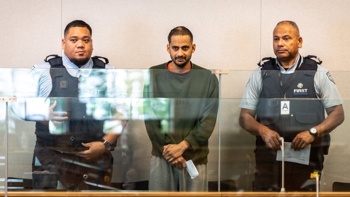
The Act Party wants to reverse a law it helped create by reverting the age people are dealt with in the adult justice system from 18 to 17 - a move that would put the country out of sync with international peers.
The policy announcement comes amid a recent spike in high-profile youth offending - including ram raid burglaries - and electioneering between Act and National to come up with “tough on crime” policies.
“It’s clear that the youth justice system isn’t deterring young offenders from committing crime, and isn’t delivering justice for victims,” said leader David Seymour. The policy is being unveiled in Tauranga today.
The policy would see 17-year-olds dealt with in the adult court system, in District and High Courts as opposed to Youth Courts, but not generally sent to adult prisons.
“Offenders under the age of 18 who are sentenced to jail are kept within a youth unit, or a segregated adult unit if a youth unit is not available, rather than housed within the general prison population,” Seymour said.
The policy comes amid increasing political attention on crime ahead of this year’s election. It follows National launching its own law and order playbook in June, where it nabbed two of Act’s ideas in reinstating the Three Strikes legislation and cutting funding for cultural reports used in sentencing.
Seymour told the Herald it would be a “high priority” in any future government it was a part of, and believed National would “come around” to support it too.
National is neither ruling in nor out the Act policy, its justice spokesman Paul Goldsmith stating they would look at the proposal “should we be in a position to form a Government”.
Meanwhile, Green Party co-leader Marama Davidson called it “dangerous” and flew in the face of evidence that locking up teenagers further entrenched them in lives of crime.
In 2016, the National-led Government, in a coalition with Act, took 17-year-olds out of the adult justice system.
The changes, which came into force in 2019, meant lower-risk 17-year-old offenders would be dealt with by the Youth Court, which had more of a focus on rehabilitation, community sentences and addressing the root causes of offending.
Serious and violent 17-year-old offenders continued to be dealt with by adult courts, such as for murder, manslaughter, sexual assaults, aggravated robbery, arson, or serious assaults.
National’s then-Justice Minister Amy Adams said at the time the change would help reduce reoffending and tackle the root causes of crime.
“[Youth court] offers our best opportunity to break the cycle of reoffending,” she said.
“It’s shown that it is effective at reducing crime and holding young offenders to account, by giving them tough but targeted punishments when they commit crime.”
It had wide Parliamentary support and was backed by the Human Rights Commission and Office of the Children’s Commissioner.
The move came after New Zealand faced international criticism over including 17-year-olds in the adult justice system, with it one of few places in the world to do so.
Reversing it back to 17 would put New Zealand out of sync with countries it often compares itself to, such as Australia, Canada and the United Kingdom.
The Police Association did not back the change at the time. A survey of its members found 73 per cent were opposed to the change. Only 45 per cent of Youth Aid officers supported the change, and only then with additional resourcing.
Seymour said promises of reduced youth crime had not eventuated.
Reoffending rates were about the same as they were prior to the change, he said. He also cited data that showed 17-year-olds were being proceeded against at a lower rate by police.
“One of two things has happened, 17-year-olds started committing half as much crime to fit into their new age category, or 17-year-olds kept committing crime but got proceeded against half as often under the Youth Justice system,” he said.
According to Ministry of Justice statistics, however, youth offending is down by over 60 per cent in the past decade, looking at the total number of children and young people charged in court.
The two-year reoffending rate for young people who appeared in the Youth Court with a proved case also decreased from 63 per cent for the 2011 cohort to 47 per cent for the 2019 cohort.
Seymour said he accepted those statistics but pointed out it was also a measure of how often police chose to prosecute.
He said from speaking to people like shop owners it was clear there had been an increase in youth crime but a decline in consequences.
Seymour said 17 was an age when young people should understand that consequences come from breaking the law and that they would be held accountable for doing so.
He cited a recent example of a 17-year-old avoiding prison after violently beating a 78-year-old man in his own home and leaving him for dead.
Putting 17-year-olds back into the adult system would also free up Oranga Tamariki to better focus on vulnerable children and not to “house young men who are well on the way to becoming hardened criminals”.
Act also wants to switch responsibility for jailing young people from Oranga Tamariki to Corrections.
Take your Radio, Podcasts and Music with you









